This post may contain affiliate links. We may earn money or products from the companies mentioned in this post.
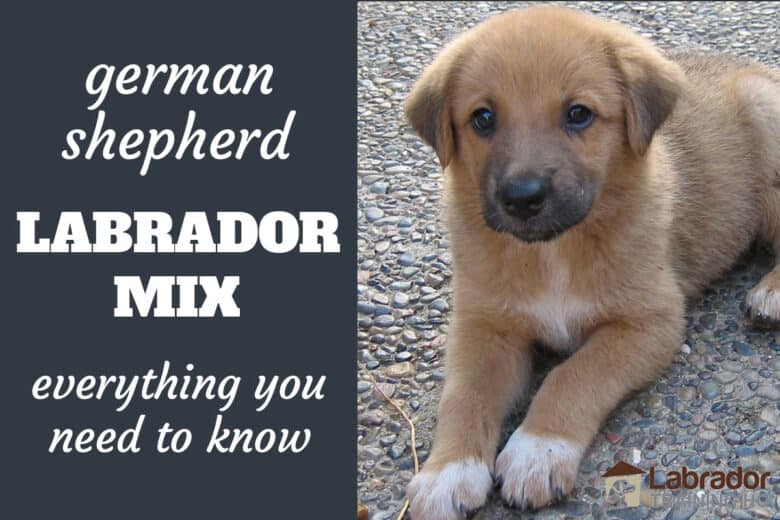
German Shepherds and Labradors are both intelligent and lovable dogs, and two of the most popular breeds in the United States.
It is, therefore, no surprise that some breeders are starting to mix the two. Considering whether a German Shepherd Lab Mix is right for you? Read on for everything you need to know about this amazing mixed-breed dog.
Lab German Shepherd Mix Overview
- Size – 22 to 25 inches tall and 50 to 80 pounds
- Coat – Medium length, double coat, color varies
- Shedding – Yes
- Lifespan – 10–14 years
- Temperament – Intelligent, active, and loyal, but can be wary of strangers
- Trainable – Highly, but prone to destructive behavior when bored
- Activity – Highly active (needs two hours of activity per day)
- Best For – Families and people with active lifestyles and lots of time to spend with them
What is a German Shepherd Lab Mix?
The German Shepherd Labrador Mix, aka the Lab German Shepherd Mix, aka the Sheprador, is what you get when a German Shepherd mates with a Labrador (to state the obvious).
As these dogs are roughly the same size, the mother can be of either breed as long as she is larger than the father, to ensure against any difficulty in the birthing process.
Sheprador Appearance
As is the case for most mix-breed dogs, it is a bit of a gamble what you will get when these two come together.
They might have the pointed ears of a German Shepherd or the floppy ears of a Labrador. There is nothing to do but wait and see. But luckily, both German Shepherds and Labradors are attractive dogs, so however they turn out they should be handsome.
That said, we can make a few generalizations about the appearance of Shepradors.
Size
As both German Shepherds and Labradors are medium- to large-sized dogs, you can expect their mixed offspring to be the same.
German Shepherds are the larger of the two and are usually between 50 and 90 pounds and 22 to 26 inches tall.
Labradors are only a little bit smaller, at 50 to 80 pounds and 22 to 25 inches tall.
So expect your German Shepherd Lab Mix to stand between 22 and 25 inches tall and weigh 50 to 80 pounds. You can narrow this range down a bit by looking at the size of the parents.
Color
The color of these gorgeous mixed-breed dogs is also highly variable, and you might end up with a pooch of a solid coat color, like Labs, or striking mixed coloring, like German Shepherds.
A lot of this depends on the color of the Labrador parent, whether they are yellow, black, or chocolate.
As a general rule, the darker the lab parent, the darker the coat of the pup. But you also get white German Shepherd Dogs, which can result in striking white Shepradors.
Basically, it’s a bit of a lottery and you don’t know what you are going to get.
Coat
When it comes to coat length, you should expect in most cases that your Lab German Shepherd Mix will have a shorter coat, like that of a Labrador. This seems to be a dominant gene, and the vast majority of German Shepherd Lab Mixes end up with this type of coat.
The dog will certainly have a double coat, as this is a feature of both breeds. The undercoat will be soft and fluffy, and the guard coat rough.
This does mean that they shed—a lot. This is not the type of dog to have at home if anyone in the household suffers from allergies.
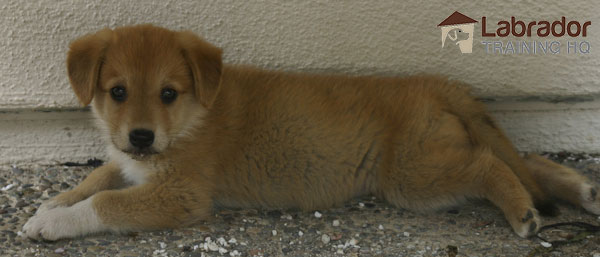
Lab German Shepherd Mix Character
While temperament is again unpredictable with mix-breeds, both German Shepherds and Labradors are intelligent, active, and loyal dogs, so you can expect their offspring to share these traits.
German Shepherds are very intelligent and have a natural protective instinct. They have a tendency to guard whatever they consider to be theirs.
Labradors were originally bred as gun dogs, to retrieve the wild game of hunters. As such, they are very obedient and tend to be pleasers, and they like nothing more than spending time with their humans.
As both breeds are intelligent and highly trainable, you can expect these characteristics to appear in a Sheprador.
However, whether they will be a guard dog that can be aggressive with strangers, or a pleaser that is great with children, you will have to wait and see.
Observing the behavior of their parents can be a rough guide, but in most cases you will be looking at the German Shepherd parent to ensure they aren’t too diligent in their guarding duty.
While dogs are a mix of nature and nurture, if you want to take a Lab German Shepherd mix into a family home, or if you are a first-time dog owner, you will want to be careful about which individual dog you choose.
Activity Levels
However their personality turns out, you are going to have a dog with a lot of energy. These larger dogs that are used to working need around two hours of exercise each day.
Their intelligence also means they get bored easily, and when they do get bored, they can have a tendency toward destructive behavior, which means digging and chewing. You shouldn’t leave Sheprador at home for hours on end.
They do best with active owners with whom they can go walking, hiking, and running. Whether these dogs will like swimming is a coin toss.
While Labradors love the water, German Shepherds are a bit more wary. But their size and adventurous nature mean they can be trained to love the water.
So you have a good chance that your Lab German Shepherd Mix will be a swimmer.
Caring For A German Shepherd Lab Mix
Caring for a German Shepherd Lab Mix starts with love. These dogs are loyal and love being around their humans.
You will find them at their happiest and healthiest when you make them part of the family and shower them with love. But let’s dive into the details.
Exercise
Ideally, your Sheprador will need around two hours of exercise per day. This might be more than just a long walk, as their high energy levels mean they will like to run as well.
They will enjoy tackling tough trails with you at their side, and the retriever nature of Labradors also means this breed is likely to enjoy a good game of fetch.
Bear in mind that these dogs will need this level of exercise rain or shine, or they will become frustrated and start engaging in destructive behavior.
These dogs can also tend toward obesity if they don’t get enough exercise. This is not only bad for them in general, but can put excess pressure on their hips, which are also prone to issues.
Intellectual Stimulation
German Shepherd Lab Mix dogs are invariably highly intelligent, which makes them easy to train but also means they get bored very easily.
When they do get bored, they are smart enough to find trouble, and you may come home to quite the scene.
These dogs need to spend time with people to occupy their minds, and they also benefit from intellectually stimulating games. But expect them to make short work of these challenges, as they are chewers. You will be getting them new games quite often.
Companionship
Labradors need a lot of companionship, and this is a trait their offspring with German Shepherds are likely to share.
These are not the type of dogs you can leave home alone for 12 hours a day while you’re at work. Not only will they get bored and start acting up, but they can become depressed.
Grooming
Both German Shepherds and Labradors are shedders, so you can be sure their Sheprador offspring will be as well.
This is just a fact of life with Shepradors. They will need to be brushed at least twice a week, and as often as once a day during the shedding seasons (fall and spring).
As well as brushing, invest in a good quality vacuum cleaner that has special functionality to help you pick up dog hair.
These dogs are also likely to enjoy jumping up on the couch for a snuggle and a snooze. Invest in coverings and be sure your swanky vacuum cleaner has an attachment for upholstery.
Their coat is not the only part of their grooming to attend to. You need to clean their teeth three times a week, with a brush or with dental treats. If you want to learn more about this, read our article on how to clean your dog’s teeth and why it is important.
It’s also important to clean their ears regularly, about once a week, as bacteria, yeast, and parasites live in the insides of their ears. You can learn how to clean your dog’s ears here.
Finally, trim their nails every three months. This is both for their health and the health of your home, as their nails can damage your floors. For a big dog like this, it can be a good idea to take them to the vet to get their nails clipped. But if you feel confident to do this at home, check out our list of the best nail clippers.
Diet
German Shepherd Lab Mixes are big dogs that have lots of energy, but they also have a tendency toward obesity, which means they have to get their energy from good sources. This means high-quality protein and fats over carbohydrates.
QUICK RECOMMENDATION: You can check out our list of dog foods for Labs and dog foods for German Shepherds to get an idea of what might be a good food for your Sheprador.

Ideally, they need to be getting around 22% of their daily calories from protein, and about 5–8% of their calories from fat.
Preferably this means meals made from quality meats rather than meals or byproducts. When looking at the ingredient list, look for named meats at the first ingredient.
Lab German Shepherd Mixes also benefit from novel proteins in their diet, as they can be prone to allergies.
Dogs tend to develop allergies to the meats they eat the most, which often means beef and chicken.
Try novel proteins that aren’t in every dog food, such as venison and rabbit, to help prevent them from developing allergies.
When they are puppies, Shepradors should be fed three times a day, and this should be cut down to two times a day from about four months of age. But don’t leave them without food for more than 12 hours, as it can upset their stomachs.
How Much Should I Feed My Sheprador?
As a rule, dogs need 25 to 30 calories per pound of their weight per day, though you should watch their individual weight and energy level to see if you need to adjust their meals up or down.
You can also check the label on your dog food to get a rough estimate of how much you should be feeding your Sheprador. Of course the amount will also vary depending on how often you exercise your dog.
Known Health Problems
While there is no limit to the number of health problems that a dog of any breed can develop, or they might not develop any at all, some dog breeds are more prone to some conditions than others.
German Shepherd Lab Mix dogs have the potential to develop the health problems that are common in goth German Shepherds and Labradors. These include:
Hip and Elbow Dysplasia – This is a condition where the hip and elbow joints do not develop normally and that can cause extreme pain and arthritis in later life. This can be prevented by giving them appropriate exercise when they’re puppies and maintaining a healthy weight throughout their lives.
QUICK TIP: We used Glucosamine with our our older dogs Stetson and Linus and it helped to ease their joint pain/arthritis. For more information check out our list of Glucosamine for Dogs.
Progressive Retinal Atrophy – This is a group of degenerative diseases that affect the eyes and can lead to blindness.
Obesity – When not properly exercised or when overfed, Shepherd/Lab mixes have a tendency toward obesity. Shepradors are also prone to eat whatever is put in front of them, so you need to be conscious of what you are feeding them.
Gastric Dilatation Volvulus – Poor diet can lead the stomach to dilate and expand, in turn leading to a twisting of the stomach that is life-threatening. It can block the flow of blood to the abdomen, leading to rupture of the stomach walls, and put pressure on the diaphragm thereby inhibiting the lungs.
Degenerative Radiculomyelopathy – This is a condition that affects the spinal cord and leads to progressive weakness of the hind limbs, and eventually paralysis.
Panosteitis – This is an inflammation of the outer surface of the long bones in the legs, resulting in a shifting lameness and making bones more susceptible to breaks.
Allergies – Dogs can be born with allergies or develop them over time. Dogs often develop allergies if they eat the same foods consistently.
Underactive Thyroid – The thyroid manages hormones, and an underactive thyroid is unable to secrete the required hormones. This can result in weight gain, lethargy, and cold intolerance.
Life Expectancy
Labrador German Shepherd Mix dogs have a life expectancy of 10 to 14 years. They will move into the stage of being “senior” at about six or seven years.
At this time, their energy levels will drop and they will need some changes in their diet and exercise.
How To Train Your German Shepherd Lab Mix
Shepradors are highly intelligent and enjoy having work to do, so they are highly trainable.
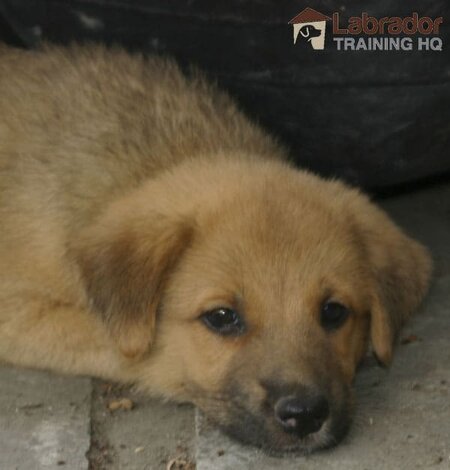
But no matter how well trained they are, if they are left to get bored for too long, they can engage in some pretty destructive behavior, such as digging and chewing everything in sight. You have been forewarned.
The highly assertive nature of German Shepherds means they do not respond well to domination training.
They are likely to revolt when subjected to punishment. The best way to train a Labrador German Shepherd Mix is through positive reinforcement.
Labradors are pleasers that love to make their humans happy. This means their offspring are also likely to feel the same way. So they will respond rapidly to training based on rewards for positive behavior.
When training a German Shepherd Lab Mix, focus on socialization, as they may have inherited the German Shepherd’s tendency to be hostile toward strangers. Deal with this behavior early, with specific training for dealing with children and strangers.
While this dog will probably be great with your kids, as they are very loyal and will bond with them, teach your kids to respect the dog’s boundaries and read their behavior.
Who Should Own A Lab German Shepherd Mix?
Shepradors are loveable and amazing dogs, but they aren’t for everyone. They are very active and need lots of attention, so they need to be in households that support this. But they do great with adults and kids, so they can be a great family pet.
Remember that German Shepherd Labrador Mixes need around two hours of exercise every day, so they need someone who can commit to that level of activity. But at the same time, it means they are the type of dog you can take on all of your adventures if you like hiking and trailing.
They also need attention and stimulation throughout the day. This means they won’t thrive if left alone for the majority of the day while you are working.
While you don’t need to play with them all day long, they are happiest when there is someone around for most of the day.
If anyone in the house suffers with pet hair allergies, this is another reason Labrador German Shepherd Mixes are not the right dog for you, as they shed a lot.
Consider something like a Labradoodle or Goldendoodle instead. This is a Labrador Retriever or Golden Retriever mixed with a Poodle.
Poodles have a coat that doesn’t shed much, so can reduce the amount of hair compared to what a Labrador sheds.
Buying A Sheprador
If you are looking for a German Shepherd Labrador Mix pup, go directly to the breeder if you can, so you can meet the mother and father and get an idea of what their puppy’s future behavior might be like.
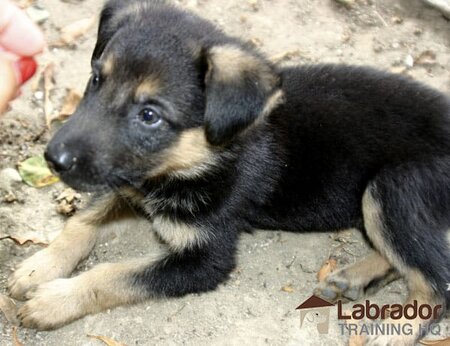
How a puppy seems at the time won’t tell you much about how they will be in the future. Also, ask for medical records of the parents, to see what health conditions the pup might be prone to in the future.
If you decide to adopt a mature dog, spend a bit of time with them to see what their temperament is like.
A German Shepherd Labrador Mix puppy will cost anywhere between $125 and $2,500+ depending on where you are and whether you go through a breeder or a rescue.
Here are a few price points we’ve come across for German Shepherd Lab Mix Puppies:
- The highest I’ve seen designer breeders sell Shepradors for is $2,500.
- When I volunteered as a foster I took in a litter of German Shepherd Lab mix puppies (we didn’t know the exact parentage). When the puppies turned 8 weeks old the rescue I volunteered for sold them for $300 per puppy.
- My puppy Linus was a Lab Shepherd Mix (although he was part Australian Shepherd). To give you an idea of pricing we paid the animal shelter a $37 adoption fee for Linus and it included his first set of vaccinations, microchip, and a couple of dog toys. Adoption fees have gone up the shelter I rescued Linus from now charges $125 for adoption.
History of the Breeds
German Shepherd
German Shepherds originated in Germany in the late 19th century as a sheep herding dog. But, because they are very intelligent, trainable, obedient, and strong, they have since moved into many different working roles including police, military, search and rescue, and disability assistance.
German Shepherds can have a reputation for being aggressive, but they are more alert and wary than aggressive. They can have a tendency to become overprotective of family and territory. But if socialized and trained properly, this tendency should be highly manageable.
German Shepherds are the second-most popular dog in the United States and the seventh-most popular dog in the United Kingdom.
Labrador
Labradors, also known as Labrador Retrievers, were initially used in Newfoundland as fishing dogs to retrieve fish that had gotten away. They were imported to Europe in the 1830s, where they were used as gun dogs to retrieve a hunter’s wild kill.
Because they are incredibly friendly but also intelligent and therefore easy to train, today Labradors are favored as disability assistance dogs, often helping individuals with blindness, ptsd, mobility issues and autism.
Labradors are the most popular dog breed in the United States.
FAQs
Is a German Shepherd Labrador Mix A Good Dog?
German Shepherd Labrador Mixes are great dogs, which is no surprise since they bring two of the world’s most popular dogs together.
They are intelligent and therefore easy to train, and loving and loyal, so they will quickly feel like part of the family.
However, they do need a lot of exercise and attention, so adopting a Sheprador into your family is a commitment.
Are German Shepherd Lab Mixes Aggressive?
German Shepherds have a reputation for being aggressive, but it is not really deserved.
They are natural watchdogs and reserved around strangers, but they are not aggressive dogs that are likely to attack.
They are also intelligent and easy to train, which means easy to control.
Their offspring with Labradors are likely to have these qualities but also a Labrador’s more friendly disposition, making them very unlikely to be aggressive.
What Is the Best German Shepherd Mix?
As well as Labradors, German Shepherds mix well with Golden Retrievers (called a Golden Shepherd), and with Siberian Huskies (called a Shepsky).
What Is The Most Friendly Dog?
Labradors are among the friendliest dogs out there, but they aren’t alone. Beagles, Poodles, Boxers, Golden Retrievers and Spaniels are all extremely friendly dogs as well, many specifically bred to be companions.
The Verdict
German Shepherd Labrador Mixes are loveable dogs that make great pets, but they need a lot of exercise, love, and attention, which means they aren’t ideal for every household.
They do best with active people or families who are full of people to love them.
Like all dogs, they will do their best when they are cared for properly.
This means training them appropriately, exercising them, keeping them mentally stimulated, and feeding them well. But these loyal pooches will repay your care and commitment with a lot of love and affection.
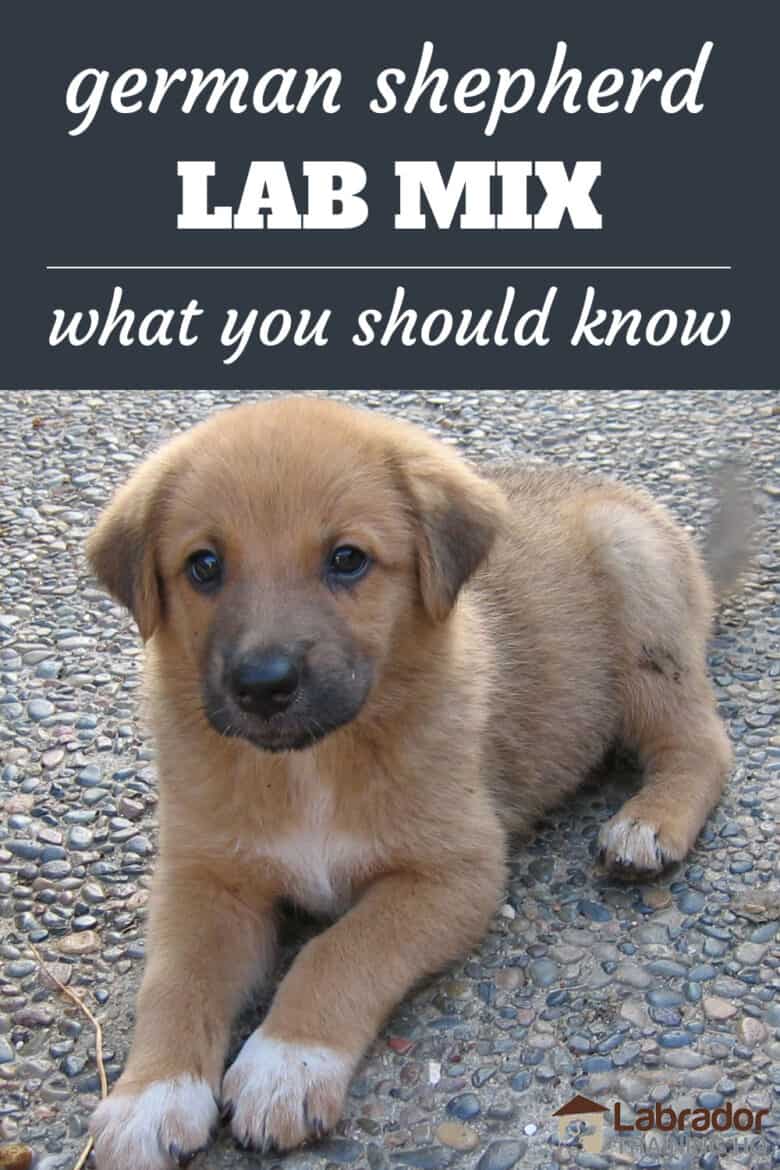
Top Picks For Our Dogs
- BEST PUPPY TOY
We Like: Calmeroos Puppy Toy w/ Heartbeat and Heat Packs - Perfect for new puppies. Helps ease anxiety in their new home. - BEST DOG CHEW
We Like: Bones & Chews Bully Sticks - All of our puppies love to bite, nip, and chew. We love using Bully Sticks to help divert these unwanted behaviors. - BEST DOG TREATS
We Like: Crazy Dog Train Me Treats - One of our favorite treats for training our service dog puppies. - BEST FRESH DOG FOOD
We Like: The Farmer's Dog - A couple months ago we started feeding Raven fresh dog food and she loves it! Get 50% off your first order of The Farmer's Dog.
For a list of all the supplies we get for our new service dog puppies check out our New Puppy Checklist on the PuppyInTraining.com blog.
15 comments
First of all., Thank you for your cool suggestions..,
I would like to have German Shepard mix any prime breed like labrador, Golden retriever or Husky..,
What price range.., I need active and golden black in color.., where can I buy a best one around.
In general you won’t find many if any breeders that breed specifically for a German Shepherd Lab mix. However, if you visit the animal shelters you can often come across this type of mix. When we were working as fosters we took in a 4 year old purebred German Shepherd and a litter of German Shepherd Lab mix puppies (the ones you see in the pics on this article). When the puppies reached 8 weeks old the rescue organization sold them for $300 a piece and that included their first round of vaccinations as well as de-worming.
Well my little girl does not seem to be easily trained. She seems very independent minded and stubborn truth be told. She is 14 months old and is a hard leash walker; which varies from day to day. Another words one day she will walk well with a stay with me and corrections with easy and the next day she’s a sled dog. I adopted her from a shelter at six months. By then she had been at 2 shelters and had had one owner by that time. Ive taken both private and group classes with her but walking is still a challenge. I was told by my trainer she may be too much dog for me, but needless to say I’m committed to her. Suggestions?
Two pieces of equipment we use with our puppies that pull on leash are the easy walk harness and/or the gentle leader. These can be helpful in deterring a dog that likes to pull.
Our 21 month old white Sheprador is a very powerful leash puller. She also loves to climb on top of stuff. She has a genetic stub tail. (about 6 inches).
Better late than never? Janice, if you haven’t, look at Tom Davis, America’s Canine Educator website and YouTube videos! I have learned a great deal from him. Mainly that our dogs require structure, routine, boundaries and limitations. My 3yr. Old female GS rescue which I have had 6 months now is finally shaping into an obedient dog on walks. Was leash reactive to other dogs, always pulling and ahead of me. But that was MY fault. I let her do it. Tom says dogs going crazy on leash out front if owners do nor REALLY enjoy this! They are nervous and confused. The WANT leadership. He is a true dog whisperer. You can tell how much he lives dogs and the work he does educating dog owners. I think he is amazing!! Never give up on yourself or your dog. They need us and give us so much love. The least we can do is protect and live them back. Best wishes!!
Thanks for your suggestion Colby. I’ve tried both and she pulls through both♀️
I recently got a german shepherd mix with a lab but the breeder told us it was 8 weeks old but when we bought it we wonder why was it so small then a couple of days later we found out that they sold us a 5-week old puppy what do we do it’s too young to be away from its mother do you have any suggests on what we should do.
Man I just went through the same situation.Can you let me know how your situation is going.Mines is ok other than she pisses everywhere in the house.
Thank you this has helped me so much with my shepherdor, kitty kitty! A very beloved member of my family and the best I’ve ever had! When I was fleeing a domestic violence situation he was so protective of me and made me feel so safe while giving me so much love and affection this dog is a wonderful wonderful dog I could not live without him and highly recommend them as he has protected my daughter in the same way he has protected me.
My Shepherd Husky Lab turns 1 on Monday Feb 14th I just came across this by way of looking for something else. I read your entire article as I love my dog and will also be loyal to him. Also first time Dog dad in adulthood. Had a German Shepherd from when I was born till about 6. A show jumper Axel was. Then I was 14 when parents decided 2 Siberian Husky’s would be best for us. Well with them at work I felt overwhelmed with responsibilities for always having cats. I did not get another dog for 33 years. Always had cats. Easy peasy. Was diagnosed with Melanoma, mom diagnosed with terminal lung cancer, her third time developing it, was terminated without cause couple months into COVID pandemic which led to a wrongful dismissal lawsuit and the mail in the coffin was the separation with my wife of 20 yrs. 10 married. That was Aug 2019. I have had full custody of my two teenage boys. 18yr old type 1 diabetic and 14yr old asthmatic. Thru everything the boys have always wanted a dog since they were very young but I never bought in. I thought this was the perfect time for another family member where we could spend the time and love it unconditionally while receiving it back. That’s been our story for the past 2 plus years and the last year with our Shepherd Husky Lab has been so helpful and could never imagine being loved so much by an animal. Thoughts cats showed much love but the point of all this is that I wanted to say what an awesome very articulate and almost right to the point factually and perfectly stated. Our fur creature Apollo is everything you stated. I mean every little detail. This would be very helpful to any new dog mom or dad. Like stated by others our dog pulls quite a bit. More so with company in sight or attention from others; pets or humans lol. Apollo is exactly like you described. Mom – River is purebred German Shepherd, Dad – Ziggy is Husky/Lab. Apollo was one of a litter of 6. We paid $1300 and drove 2hrs for him to meet him, his parents & siblings and his owners. An amazing process and a beautiful journey thus far. Thank you for allowing me to share.
Hi Dermot, I just had to pop in to say my dog has the exact same birthday! He’s going to be 2 this coming Valentine’s day! As far as I know he’s lab x GSD but I haven’t done an Embark on him. Yours didn’t come from Missouri, did it? I got mine for free so it’s almost definitely a coincidence but what a strange one! I hope the last year has brought healing to you and your family!
I have a sheprador ++ he is 4 years old and we adopted him from the Northwoods animal shelter. He is a dream dog his life is filled with love. He does not and has not chewed or torn anything apart. We can leave him in the house he does not chew or get into anything. He loves it outside and is very quick has caught a squirrel and a chipmunk. He is not so happy around a bunch of dogs he does like to play games but does not like rough housing. Loves to go with us any where the car is going he just sits and looks out the windows. His name is Bruno and the best dog we have ever had. The only thing I don’t like is the shedding.
I had to add my 2 cents since I just verified the genetics of our 26 month old dog. We knew the mother was a full German but just found out the father is a full black lab. I can’t say anything bad about this dog. He complements our other pure German and rough houses well with him to expend energy perfectly. Yet the dog thinks he is a black lab mostly in his other behavior. He is so ompassionate to my family. At first I thought it was mainly due to being a singleton, a dog from a litter without any siblings, but after finding your article, I think the specific bread mix may be the over riding factor. Since we have not fixed him yet, im pondering whether someone wkd want to breed a German or a black lab with him. Just a daydream.
Hi there! I have a rescue abused pup that is yellow lab and I’m positive a white GS. As a pup she was horrible. Her aggressive side at 3 1/2 months came out. Only on leash she would jump up and bite at me latching on and ripping my clothes. Broke the skin once and was bleeding. Everyone said give her back to the shelter. I said no she wouldn’t have a good chance of being adopted again if marked aggressive. I began stubbornly training her until she stopped. Also she is reactive on her leash we are still working on that but its much better. With all of there personality traits an owner needs to chose the ones they like. Then while training them with positive reinforcements help bring some of those to the forefront. While discouraging the unfavorable ones. I think we go by what a dog was originally breed for. But then the breeder breeds for certain qualities too. So a dog that was aggressive originally if breed to be aggressive then an owner treats it aggressively. You will end up with a very untrustworthy aggressive dog. But if an aggressive dog then by the breeders is breed to be non aggressive. Then the owners trains the dog in a positive way and shows it love. The dog can be loving, friendly loyal everything a person wants in a pet. So beside having a certain breed and all of their personality background. One has to take into consideration the amount of training. Plus their environment and humans interactions. My Shepador became aggressive at 3 1/2 months. It’s in her background. I don’t believe she would of naturally became aggressive. She only did because of the abuse she endured in her first 2 1/2 months of life. Guess I’m trying to say they may have traits in their background but life circumstances play a large role as well. In the personality that they show. She is 2yrs now and very non aggressive. Will bark if she thinks she needs to protect me